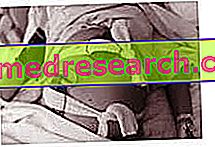Related articles: Rectal prolapse
Definition
Rectal prolapse is a protrusion of a segment of the rectum through the anal orifice; in practice, a portion of rectal intestine exits through the anus. The rectal mucosa escapes becomes inflamed and is swollen.
Rectal prolapse may occur during defecatory effort, walking or standing. Sometimes it is linked to a weakening, a relaxation or a direct injury of the anal sphincter and / or pelvic floor musculature. Constipation and excessive efforts to defecate may contribute to the formation of rectal prolapse. Several other factors can contribute: aging process, pregnancy, chronic bronchitis (eg chronic obstructive pulmonary disease and cystic fibrosis), previous surgery and some neurological problems, such as an injury or other spinal cord disease.
In general, rectal prolapse is not associated with pain, but mucus discharge, bleeding from the anus and pain in the lower part of the abdomen may occur. Furthermore, faecal incontinence is frequent and the anal sphincter tone is usually reduced.
In adults, especially if elderly, the prolapse of the rectal mucosa is persistent and tends to progressively worsen. This problem can be solved by regularizing intestinal functions and eliminating any causes of defecatory stress. In other cases, it may be necessary to remove the prolapse through abdominal or perineal surgery.

The photo shows a very severe form of rectal prolapse - Taken from: sages.org
Possible Causes * of rectal prolapse
- COPD
- Hemorrhoids
- Cystic fibrosis
- Shigellosis
- Ehlers-Danlos syndrome
- Urethral stricture
- Constipation
- Colorectal cancer
- Anus tumor



